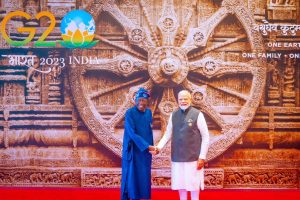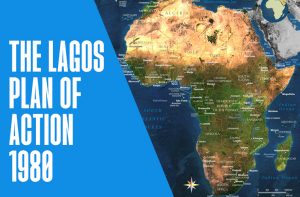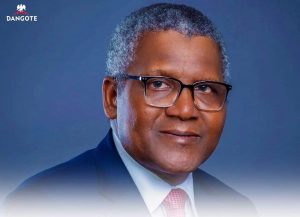By Adagbo Onoja
Irrespective of fragmentation and disaffection at home, there are certain issues that enjoy consensus in Nigerian politics, regardless of the government in power. It would be argued that one of them is achieving industrial transformation by attracting foreign investment. Why foreign investment appears privileged over mobilisation of domestic capabilities remains an issue in debate in the discourse of rapid social transformation in non-industrial societies but nothing should make Nigeria not to problematise the signal in President Tinubu’s making of foreign investment an overarching issue in his first G-20 appearance. I would think that there’s a sense in which that should be seen beyond Nigerian partisan politics in the context of the unpredictability, chaos, indeterminacy and uncertainty that makes the world hang together.
 Of course, there is the typically hyperactive treatment of the president’s G-20 outing in the media as if attempts to attract foreign investment has not been the staple of presidential missions since 1999, particularly under Obasanjo. That media hyperactivity left out the question of the paradigm within which to situate the investment drive at the G-20. It is the paradigm this piece is more interested in.
Of course, there is the typically hyperactive treatment of the president’s G-20 outing in the media as if attempts to attract foreign investment has not been the staple of presidential missions since 1999, particularly under Obasanjo. That media hyperactivity left out the question of the paradigm within which to situate the investment drive at the G-20. It is the paradigm this piece is more interested in.
The paradigm the outing draws attention to must be The Presidency in Nigeria as an instrument for accomplishing a re-invention of Nigeria. The 49 wisemen (there were no women in the panel) who drafted the constitution in use today deliberately vested vast amount of powers in the president, including making the entire country a single constituency in the election of the president. Nigeria needed such a unifying symbol of nationhood, reasoned the constitution drafters assembled by the retreating military administration which managed the 1976 – 1979 transition from military to civilian rule. The Draft Constitution these 49 wisemen produced has been amended several times but it is basically intact. It is not only a detailed and balanced document but also a progressive manifesto if carefully put to work by a patriotic power elite.
It is thus not out of tune to raise the question as to whether Bola Ahmed Tinubu, the emergent president of Nigeria can re-invent Nigeria. He is constitutionally, politically and culturally located to be able to do that although it is open to question if that is what majority of Nigerians would say if they were asked now and their views collated. Anger against the casual way the president implemented removal of state subsidy on petroleum products in his inaugural address on May 29th, 2023 and the misery that followed is still high. The unlikely positive approval rating for the capacity of the president to re-invent Nigeria must, however, be disconnected from the disaffection with the subsidy policy. This is because approval ratings for politically exposed personalities in Nigeria are determined more by the Cartesian disease about right or wrong than by reconciliation with the discursive nature of reality and the set of power relations that comes with that. Power relations is important because it is power relations that determines what can happen or cannot happen in any society.
In the context of the foregone, the answer to whether Tinubu can re-invent Nigeria or not should be another question: can he industrialise Nigeria? The argument here is that if he can industrialise Nigeria, however he does it, then he can re-invent Nigeria. If, for whatever reasons, he is not about industrialising Nigeria, then he is also not about re-inventing Nigeria in any systematic sense. In that case, he might be no more than another bird of passage even if he spends all the eight years he is constitutionally entitled to rule Nigeria.
Neither Nigeria nor any other country can talk about re-invention outside of industrialisation. India could be said to be entering modernity from the service economy rather than through traditional industrialisation. But it is still too early to draw that conclusion. In any case, India has a cultural specificity that is not applicable to Nigeria. So, Nigeria must still look to the industrial route to modernity. Industrialisation does not solve every social problems for any country but it solves more than it creates, particularly if a country has a power elite that can think and experiment. A country such as Nigeria has no reasons to shy away from centralising industrial transformation. That is still achievable in spite of the frightening level of elite fragmentation.

Conspired against and killed
The civil service which ushered independence and constituted the engine room of government and governance till the mid-1970s answered this question by giving Nigeria her highly nationalistic Second National Development Plan, a perfect document if ever there can be. Then they were mysteriously disassembled, perhaps so as to give way for the team or generation that could implement the Structural Adjustment Programme (SAP) which the International Monetary Fund (IMF) sponsored. The 1981 Berg Report which the World Bank sponsored had effectively prepared the ground for SAP by neutralising the Lagos Plan of Action produced by African leaders also in 1981. With SAP came the toning down on nationalist economic principles and practices in favour of neoliberal globalisation. It was neoliberal globalisation that brought Nigeria to its knees through SAP because it turned out to be a perfect case of ‘creative destruction’ which David Harvey, the distinguished British Marxist geographer, calls neoliberalism. He has been correct all the way in the light of there still being not a single success story of SAP in the entirety of Africa after over 40 years of implementing it under shifting labels.
The foregoing means that one way of establishing if Bola Tinubu can re-invent Nigeria is to establish his lens on industrialisation. There might be such a lens but his publicists have yet to put a label on it or sufficiently popularise it. That is not surprising. Politicians and political leaders in Nigeria are not in the habit of popularising mobilisation documents, partly because, for most, there is none and partly because they are personal documents as opposed to party documents where they exist at all. Without such a document and its key propositions well known to the public by now, we have only two speculations to fall back on regarding the president’s possible paradigm of industrialisation or even modernity.
The first is his membership of what a defunct Marxist platform in Nigeria used to call the Lagos – Ibadan financial oligarchy. The label is a reference to the concentration of the intelligentsia around that intellectual, political and business arc in Nigeria. It is that which the foremost political economist, Claude Ake, made the now dated but seminal rating as possessing the potential capacity to manage capitalism so efficiently as to make pointless any question of an alternative social system such as socialism. Ake equally attributed to them the instinct for defensive radicalism. It is true Ake was writing specifically about the tendency headed by the legendary Obafemi Awolowo, the Premier of the Western Region in Nigeria’s First Republic and the political leader of the Yoruba ethnic identity in Nigeria till his death in 1987. But there is a limit to which we can reduce those attributes to the Awolowo tendency in the light of the solidarity of the Yorubas over Moshood Abiola after the annulment of the June 1993 presidential election which he was set to win. Interestingly, Bola Tinubu of today can be said to be a product of the 30-year struggle of the National Democratic Coalition (NADECO) whose activists insisted on the consummation of Abiola’s victory. It is that struggle that made an activist out of Tinubu. There is thus a limit beyond which the Awolowo tendency cannot appropriate Ake’s characterisation.
The second speculation is the evidence from Lagos State which Tinubu formally governed from 1999 to 2007 as the governor and informally so ever since. It is not terrible to say that Lagos is that state in Nigeria with the most uncommon swiftness of the political leadership of the health sector during most health emergencies as well as the level of modern equipment on display during such times. Tinubu’s claim to have been the mastermind of that level of modernisation was a subject of debate during the electioneering campaign in late 2022. It is no longer clear who, between him and his opponents, proved own claim beyond the very agreeable point that his approach to development of Lagos were sometimes too ruthless against slum dwellers and the poor. Barrister Daniel Bwala, the Abuja based PDP publicist remains the most analytically interesting voice to listen to on that debate. If Bwala is correct as he seems, then that is an affliction the president needs to cure himself of as a matter of priority. A president that is seen as lacking in empathy is a liability to himself, sooner than later.

Domestic component of foreign investment
However, taking the two speculations together, it makes sense to argue that there is nothing that may prevent the dynamics working out in such a way that Tinubu could end up superintending industrial transformation of Nigeria against all expectations. There is no doubt that he subscribes to a variant of capitalism favoured by those who say it is better that the people are exploited and paid rather than left to wallow in “the economy of affection”. If he believes in any variant of capitalism at all, then the rest is how the civil society can discipline his government in terms of capitalism that is productive rather than speculative but equally fair. That is not what obtains at the moment because, capitalism in Nigeria is broadly agreed to be the most speculative, most unproductive and most chaotic in the world.
Apart from dealing a deadly blow on poverty and misery, a more productive capitalism in Nigeria is also an investment in national security by diverting a generally hardworking population into engagements that take them away from hostages of mobilisers of hate and sub-nationalistic consciousness. Nationalist oriented capitalist modernisation is a more credible answer to the character and magnitude of corruption in Nigeria at the moment than any of the subsisting cures. And it is what will better sustain Nigeria’s foreign policy whose doctrine of ‘Africa as the centrepiece’ successive presidents have restated commitment to. Ending an economic model built on speculation must be a priority because such an anchor cannot sustain that doctrine.
It is a task the incumbent or any other president of Nigeria can re-invent Nigeria. But it will be difficult to accomplish this without a commitment to industrialisation. The point is that there is no science which enables us to determine that only a particular president can industrialise Nigeria. The variables that compels a president to act one way or the other do not lie within the exclusive wisdom of such a president. Holding any such belief thus smacks of what French philosopher, Jacques Derrida, calls Western metaphysics and the danger of the unconscious transfer of it into the politics of meaning in Nigeria. Western metaphysics might not be exclusively Western – some philosophers think it is better called everyday metaphysics because they think it is everywhere across the world – but that is where that foundationalism or the belief that there are unshakeable grounds for meaning of things in the world comes from. Such forms of reasoning do not help our struggle for empowerment, inclusion and emancipation at local, national and global levels. Fighting it is, therefore, beyond whether one is for or against President Bola Tinubu but rather a case of using the pace it is being naturalised to clarify its dangers and limits.
Luckily, Nigeria’s popular culture has so narrativized the country in global space as for her to need no further self-narrativisation before blasting the industrialisation trumpet. Let the world hear the blast. The world needs Nigeria, even if only because it is still the highest concentration of blacks under one government in human history. This is the demographic point about Nigeria that the late Professor Ali Mazrui never forgot to stress. Africa needs Nigeria too but it has to be a functional rather than a degraded Nigeria. Unfortunately, Nigeria is a crippled polity or a polity experiencing a crippling crisis of multiple dimensions. The state-ness of the Nigerian State has been questioned in terms of legitimacy as well as monopoly of legitimate use of violence in most of the spaces where the state should dominate. The quality of social services is very low by whichever standards of measurement. The infrastructural outlay is nothing to celebrate. The perceived level of corruption in the public service is colossal. Wasteful expenditure define governance and impunity is an unchallenged god. The totality is that Nigeria is in urgent need of re-invention.




























